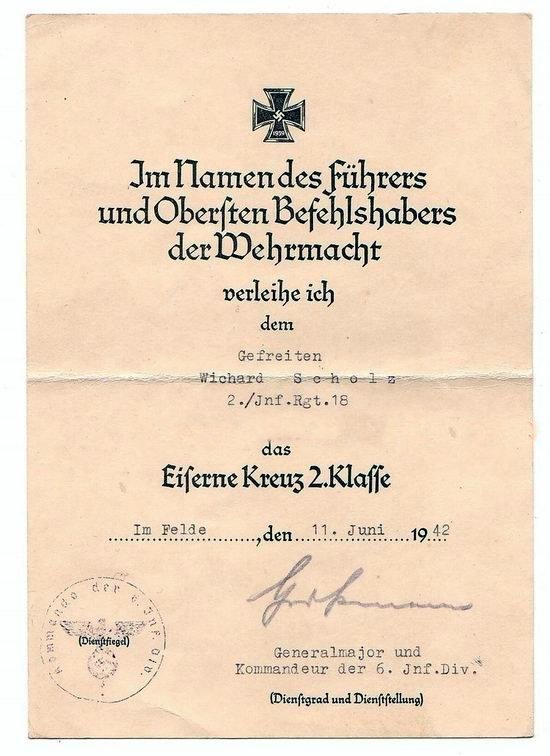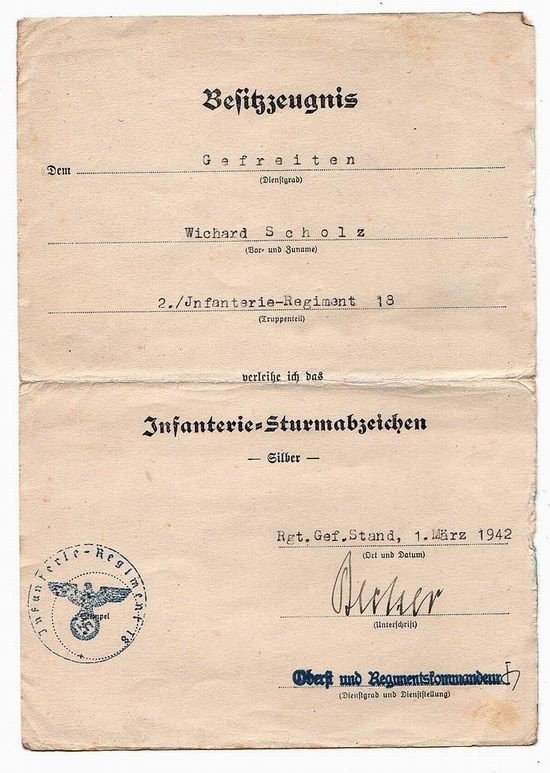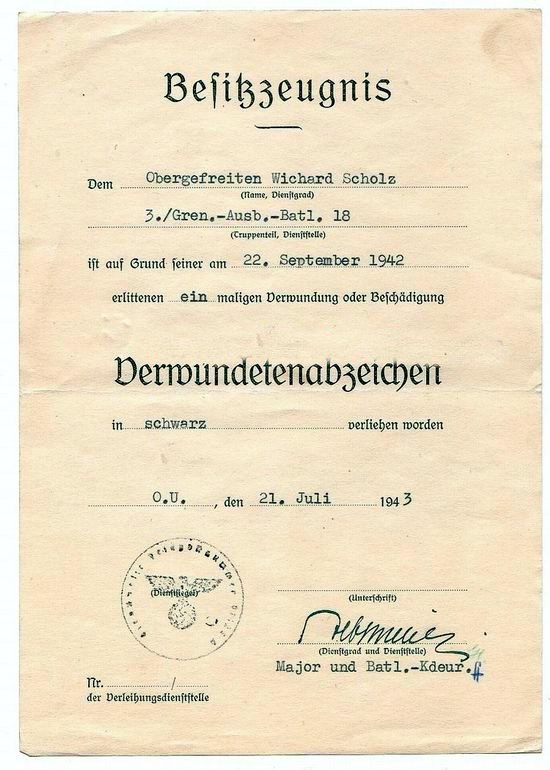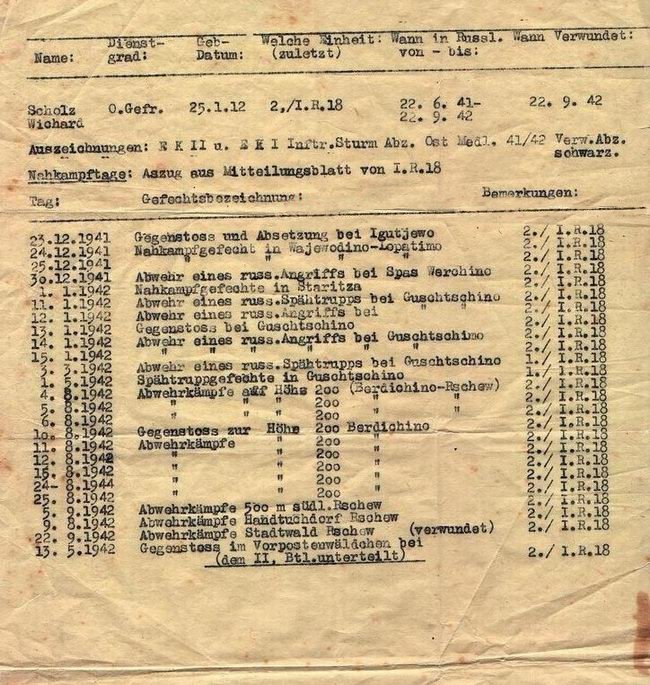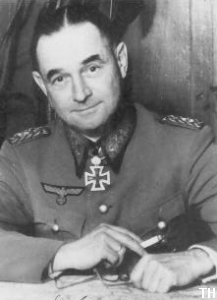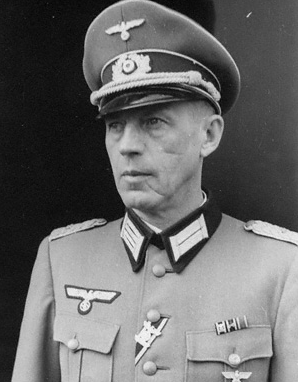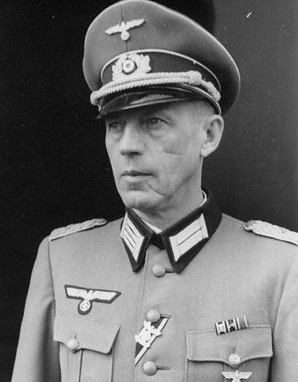Landser EK1 Recipient, Russian Front Dec '41 - May '42
A counterthrust was executed at Igutjewo
Close-in Combat in Wajewodino-Lopatimo
Defended one Russian Attack at Spas Werchino
Click here for Full Award
Click here for Full Award
Click here for Full Award
Click here for Full Award
Click here for Full Award
Click here for Full Award
Reconnaissance mission in Guschtschino
(Seconded to 1st battalion)
Defended against a Russian Reconnaissance Patrol in Guschtschino
(Back at 2nd Battalion)
Participated in the defence of Hill 200 at
Berdichino-Rschew
(backdated entry whilst still on secondment to 1st battalion) Made a Counterattack of a enemy post in the forest with a section from 2nd battalion
Wounded in action whilst defending the forest on the outskirts of Rschew
Close-in Combat in Staritza
Defended against Russian Attack in Guschtschino
All awards from J.Ooi Collection
All award photos courtesy Marc from
www.militariasales.com
July-September - Promotion
to OberGefreiter
Signature by Oberst Becker, RKT and commander I.R.18
Signature by Großmann, Horst
Signature by Großmann, Horst

The Wehrmacht, by the winter of 1941 were slowly beginning to realise their Blitzkrieg against Communism was not going to be another Poland. Indeed, after being led practically unopposed to the outskirts of Moscow, the "exhausted" enemy as they were told, threw in Army after Army from the expanses of Siberia as the Germans were digging in for Winter.
Records show a dramatic increase in the awarding of the Iron Crosses and other awards during this time. Whether it was desparate men without winter clothing determined to not be thrown out of their shelter or their training that helped him beat off attack after attack, the Iron Cross legend was really defined during this time, most recipients of the Iron Cross were ordinary Landsers, soldiers who were given this huge task of holding back the unstoppable juggernaut.
Words like the above might seem like romantic nonsense if not for examples of surviving battle records from the period.
The record below shows a Corporal's battle record during that Christmas. He was in Infantry Regiment 18, 6 Division, Army Group Center. The only division to be able to hold back the soviets and to keep the stronghold of Rzhev in German hands to enable the rest of the fronts to pull back. Losses we so high on the Russian side that the city was bypassed and then eventually taken in a pincer movement nearly a year later.
Gefreiter Wichard Scholz participated in a fighting retreat from Igutjewo, North West of Moscow in 23rd of December 1941 being in battle almost daily through 3 towns until reaching Staritza and beating the enemy off in hand to hand combat on new years day in 1942. After 10 days of apparent rest, his battalion again fellback to Guschtschino, which, after a 5 continuous days of fighting held for one month.
He was awarded the Infantry Assault Badge on the 1st of March for his part in the defence (and presumably counterattacks) during that time. Showing promise, he was then seconded to 1st battalion until August for counterattacks against recon troops.
In May another battle saw him winning a Iron Cross 2nd Class for his bravery during this action.
In August, Wichard was transferred back to his second company for the defence of Hill 200 near Rzhev.
For 24 days his company defended against attack after attack until the enemy gave up their efforts. Wichard was wounded in this action. It was only after this and all the actions preceding it that he was finally awarded the Iron Cross 1st Class, promoted to Lance Corporal and awarded the Close Combat Clasp in Bronze for at least 15 days hand to hand combat.
He was eventually taken off the line in September. It is not known whether he survived the war but he did take leave presumably back at home after being wounded as he had small civilian lapel pins of his badges (except for the CCC) made.
Mouse over the entries in the
battle record to receive approx
translations. Mousing over signatures
will also show the awarding officer.
Signature by Albsmeier, Heinrich. Appointed July 20 1942
Signature by Albsmeier, Heinrich. Appointed July 20 1942
